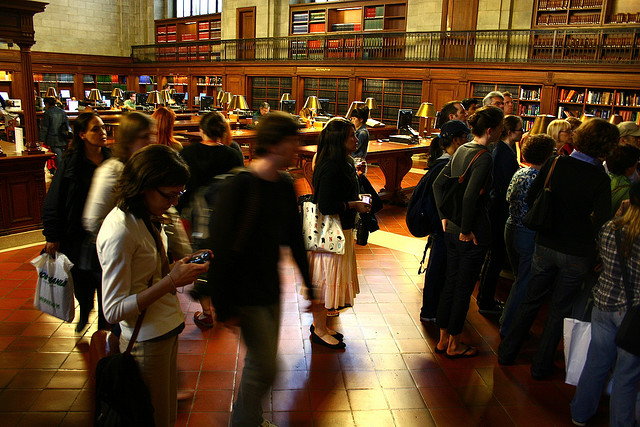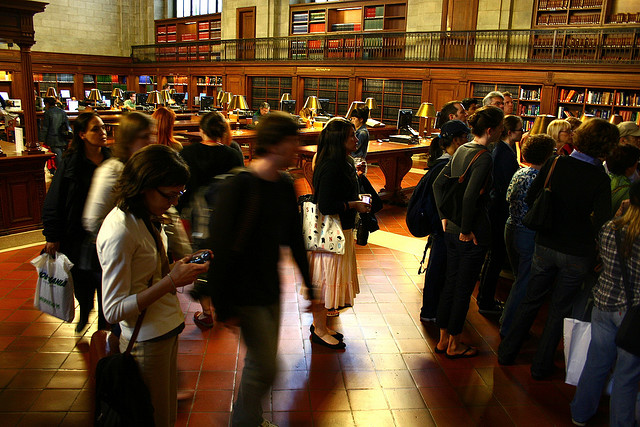Today, I was asked by a PhD candidate in Library and Information Science at the University of Western Ontario, if and how my MLIS education has shifted or changed my view of technology. Before entering this program, my academic research was predominately rooted in ways in which technology, digital media, and social networking can be used to preserve, organize, and most importantly, share information. Technology certainly does have the capabilities of creating these opportunities, but entering this program has also illuminated the strong restrictions that are placed upon digital information.
Thinking back on Justin’s thoughts Toward a New School of Art, he states, “reading is necessary for understanding the world,” and thinks about how art education must not be restricted to a traditional academic classroom setting in order to stay relevant. Blurring these two ideas together, I also feel that art research should be viewed in a similar light. Art education and related information literacy should be about about participation, collaboration, and especially access.
Academic research goes through a long process to be published. The Atlantic’s recent post on the topic clearly explains the process all the way from a paper’s conception, to its publication, to its exclusive academic library access. Open Access is one way in which scholarly research has been able to avoid this, and in turn, allow publications to receive broader readership. Open Access refers to the practice of providing unrestricted access to peer-reviewed scholarly journal articles online. Many of these can be found through the Directory of Open Access Journals.
As seen by programs in place both at Emily Carr University (where Karlyn is studying!) and Portland State University‘s, the field of art and social practice is emerging. As it grows and its scholarship develops, I hope its practitioners and researchers will continue to keep art and social practice collaborative and go down the Open Access route to keep creative engagement accessible.


Agreed.
I would be curious about what to do as more and more scholarship becomes opened to the public and as more and more creative works are licensed under a creative commons model. Is it enough to have these licenses that allow accessibility, or will it become imperative for researchers to find ways to extend its distribution?
Beyond talks and panel discussions, what else might be done to enrich the distribution process?
How do we find things we didn’t know exist if we continue to rely on the same search and discovery methodologies?
And, on a side note, and I’m sure this must exist, but I wondered about a service that would send you one highly curated article each day — could be from anywhere — but would be very tailored to a specific set of interests and based on reading history. Something like, here’s the one thing you should read today that you may not have otherwise read. Rather than getting buried in RSS readers and Tweets, it would be great if someone would send one thing to me to read each day.
Sprawling yes, but would love to hear your thoughts on the above.
Great thoughts, Justin.
I still think that researchers need to extend distribution, even if they are publishing within the creative commons model. Talks, seminars, and conferences are great, but I still feel like there can be a lot done. Perhaps the University’s need to make this research more visible through their website or through social networking tools? Or maybe that’s the department’s responsibility?
I also really love your idea for a curated article. I totally feel overwhelmed by my RSS reader on a daily basis, but it would be nice to wake up to something specific to read every morning.
Highly agree! I’m in the PSU program you mentioned and it’s been something I’ve been thinking a lot about as well…especially in this very active open source tech community that we have in Portland.
The idea of being transparent as an artist is also something mentioned in this video which I’ve been sharing a lot recently:
http://youtu.be/JZ-eSTuf7Ko
Here’s an essay I wrote recently on some of my thoughts around Social Practice:
http://jasonsturgill.com/tagged/essay/chrono
and one of my latest projects:
http://jasonsturgill.com/artisforever
Steve Lambert has a reading list for ya, Justin!
http://library.bennington.edu/screens/Read_SteveLambert.pdf
You might also be interested in this site started by recent PSU grad:
http://librarification.tumblr.com/
http://librarification.tumblr.com/tagged/books/
Wow! Really great! Thanks so much for all the links and reading material, Jason! Super helpful and insightful!
I’m also glad to see a scholar/practitioner in social practice agreeing with this necessary step. It would be great to chat about this more sometime.
Would love to chat! Always down for a skype or google video hangout. Hit me up on e-mail.
Cheers.
Jason, excellent resources, thanks for passing these along!
And, it would be interesting to talk about what it might take to get you to bring your Art is Forever project, or a version of it, here.
Yes! Would love to! Could be interesting to do something with it that crosses the border and gets people from Detroit to get Windsor related tattoos and vice versa! :)
Let’s talk!